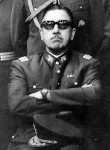 Augusto Pinochet (1915-2006) was a Chilean general who seized control of the South American country after a bloody coup in September 1973. Born to a middle-class family in the coastal town of Valparaiso, Pinochet moved from high school to military academy, graduating in 1936. He received a lieutenant’s commission in the Chilean infantry and set about building a military career. Pinochet rose through the ranks, despite seeing no combat or active service. In 1953 he became the commandant of a detention camp that housed, among other prisoners, suspected communists. He later studied and taught in military academies in both Chile and Ecuador. In 1971 Pinochet was promoted to general and the following year was appointed Army Chief of Staff. In August 1973 Chilean president Salvador Allende appointed Pinochet commander-in-chief of all Chilean military forces. The following month Pinochet initiated a military coup, backed by other military officers and right-wing politicians, and with the tacit support of the Central Intelligence Agency (CIA). This coup overthrew the government and led to Allende’s death, probably by suicide.
Augusto Pinochet (1915-2006) was a Chilean general who seized control of the South American country after a bloody coup in September 1973. Born to a middle-class family in the coastal town of Valparaiso, Pinochet moved from high school to military academy, graduating in 1936. He received a lieutenant’s commission in the Chilean infantry and set about building a military career. Pinochet rose through the ranks, despite seeing no combat or active service. In 1953 he became the commandant of a detention camp that housed, among other prisoners, suspected communists. He later studied and taught in military academies in both Chile and Ecuador. In 1971 Pinochet was promoted to general and the following year was appointed Army Chief of Staff. In August 1973 Chilean president Salvador Allende appointed Pinochet commander-in-chief of all Chilean military forces. The following month Pinochet initiated a military coup, backed by other military officers and right-wing politicians, and with the tacit support of the Central Intelligence Agency (CIA). This coup overthrew the government and led to Allende’s death, probably by suicide.
Pinochet governed Chile for a year as head of a military junta, after which he assumed the powers of a fascist military dictator. The United States welcomed Pinochet’s coup and provided his government with almost $US400 million in aid and loans. The CIA also provided information and training to Pinochet’s secret police, the Dirección de Inteligencia Nacional (DINA). Pinochet’s grip on Chile became oppressive: thousands of his political opponents were hunted down, arrested and detained, while others vanished without a trace, probably murdered. All were deemed “communists” by Pinochet, though the majority of his opponents and victims were moderate socialists, social democrats and liberals. The human rights abuses in Chile were investigated and widely publicised during the late 1970s, discrediting Pinochet. Domestically the new regime in Chile undertook significant economic reform, opening the country for business development and foreign investment. This restored economic growth, however, unemployment and poverty both grew under Pinochet’s rule.
Pinochet’s reign ended in 1990 following several years of pressure for democratic reform, both within Chile and also from the US. During a visit in April 1987, Pope John Paul II also urged the Chilean ruler to relax his grip and allow democratic reform. Pinochet agreed to a referendum (October 1988) that effectively shattered his dictatorial power. The country began its transition to democracy and Pinochet was ousted from the presidency in March 1990. In 1998 the ageing former dictator travelled to Britain for specialist medical care. In October 1988 he was arrested for authorising the assassination and torture of Spanish diplomats and civilians in the 1970s. In a controversial decision the British government – one of Pinochet’s allies during his presidency – ruled the former dictator could not be extradited to face justice in Spain. Pinochet was instead returned to Chile, where he was granted immunity from prosecution. This immunity was revoked in 2004 but Pinochet died in December 2006, before any charges could be laid. Subsequent investigations into Pinochet’s years in power have uncovered evidence of political murders, widespread torture, corruption, tax fraud and money laundering.
Content on this page is © Alpha History 2018-23. This content may not be republished or distributed without permission. For more information please refer to our Terms of Use.
This page was written by Jennifer Llewellyn and Steve Thompson. To reference this page, use the following citation:
J. Llewellyn & S. Thompson, “Augusto Pinochet”, Alpha History, accessed [today’s date], https://alphahistory.com/coldwar/augusto-pinochet/.
